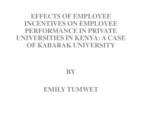EFFECTS OF EMPLOYEE INCENTIVES ON EMPLOYEE PERFORMANCE IN PRIVATE UNIVERSITIES IN KENYA: A CASE OF KABARAK UNIVERSITY
Abstract
Human resource management is the strategic approach to the management of an
organizations most vital asset, the people who contribute to the achievement of the
objectives of the organization. Employee incentives constitute some of the high
performance work practices used by organizations to improve knowledge, skills,
and abilities of current and potential employees, increase motivation and enhance
retention of quality employees. Need for-empirical study, to determine the
influence of these incentives on employee performance. The study examined the
relationship between specific employee incentives to employee performance in
private Universities in Kenya. The study population was all the employees of
Kabarak University, -a census study was carried out .The study involved use of
structured questionnaire. The analysis of the collected data was done by use of Mann
Whitney U test, factor analysis and Chi-square, and presented using descriptive
statistics in frequency tables and charts. Financial and nonfinancial incentives are
applied to a great extent to motivate the employees.
Financial incentives that are perceived to have significant influence on
employee motivation include: salary, insurance financing, retirement benefits,
performance based rewards,etc. Among the non-financial incentives with
significant influence on performance were: creativity at work, organizational
goals, challenging tasks, opportunity for personal development, autonomy and
responsibility, teamwork, job security, professionally stimulating environment,
opportunity to set performance goals, predictable work life, opportunity to
lead, training and development and flexible policies. Recommendations
include; the need for top management of organizations to design effective
incentive schemes that comprise a mix of financial and non-financial
incentives, with non-financial incentives being key, supplemented by financial
incentives. The findings are vital for policy makers in human capital intensive
organizations such as universities and managers in general.

